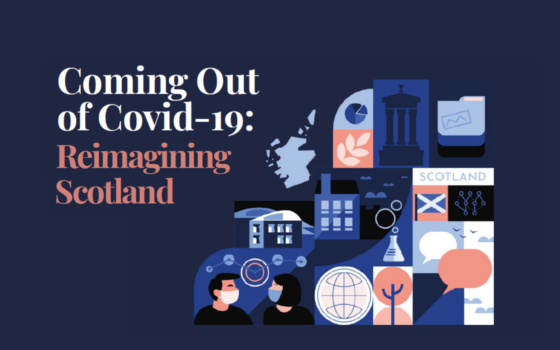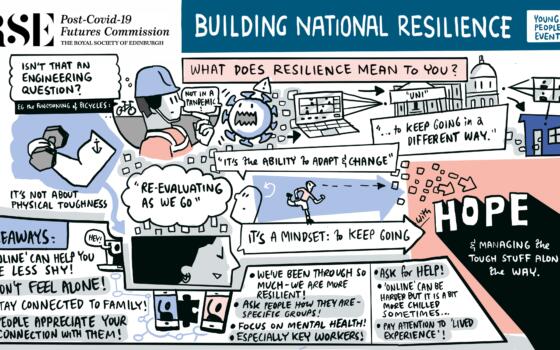Roundtable with organisations and institutions
The Building National Resilience working group hosted an online roundtable with a range of organisations and institutions covering different parts of public life in Scotland including the emergency services, environmental and outdoor access bodies, the care service, advisory bodies on poverty and inequality, universities, government and enterprise bodies.
The roundtable was co-chaired by Professor Fiona Strens and Francesca Osowska, both members of the working group. The roundtable addressed a series of questions relating to the short and longer term impacts of the Covid-19 pandemic on organisational resilience. This note summaries the key issues discussed, and the points raised have been used to inform the BNR working group’s key learnings.
What were the short-term impacts on organisations from the pandemic, how did they adapt and change their perception of risk?
Impact of the Pandemic on Humans and Nature
- Organisations are people-based, and the most notable impact has been the public health consequences of the pandemic, notably excess deaths and severe illness.
- The impacts of the pandemic have been felt disproportionately, with individuals and communities from deprived backgrounds suffering more than others. The pandemic has also exacerbated existing structural inequalities.
- The pandemic has and will continue to have profound implications for people’s mental health both in the short and longer term.
- Related to this, there is a risk of a legacy of fear and anxiety from the pandemic, as people may be worried to go to work in case they become infected and endanger the health of their families.
- The value of the natural environment and access to open space has been highlighted during the pandemic; while it is notable that the pandemic occurred as a consequence of humans’ relationship with the natural world, emphasising that to ensure society is more resilient against future pandemics means addressing the climate and nature crises.
Operational Impacts
- Operationally, the immediate impacts were felt on organisations’ finances as trading-related sources of income were severely restricted or closed off entirely. Organisations have differential experiences of managing this given their respective funding streams and activities, and in their access to financial reserves.
- There was a sense of simply trying to keep the ‘show on the road’ as best they can while managing a range of acute pressures as a consequence of the pandemic e.g. impact on activities and finances, the need to respond and adapt quickly, and the need to support and re-deploy their workforces.
- Many organisations adapted quickly to new ways of working, including extensive use of home working and increasing use of digital technologies. However, the pace and nature of adaptation was a challenge for many organisations, and in many cases required them at very short order to change the way in which they deliver their core business e.g. universities rapidly moving from on campus to remote learning.
- The response to the pandemic highlighted the value of lower-paid staff, including cleaners and facilities staff, to organisational success, which has often been overlooked in the past. It also highlighted inequalities within workforces where lower-paid staff were required to work in situations where they were at risk of contracting the virus and had fewer opportunities to work remotely.
- Sustained communication with staff and stakeholders at a time of significant change and disruption is crucial.
- While government and organisational plans aimed at supporting resilience have been put in place following previous major challenges, including in response to the swine flu outbreak and as part of the UK’s pandemic flu planning, there was a sense that the lessons learned from these experiences were not acted on as they should have been, and that new plans and approaches had to be developed and implemented very quickly in response to the Covid-19 pandemic.
- For care-related organisations and the emergency services, among others, the immediate and global demand for Personal Protective Equipment (PPE) severely impacted them, even in those cases where organisations had contingency supply chain plans in place.
- Organisations valued government interventions including the Job Retention Scheme as these were necessary to maintain the viability of many organisations, and to reduce unemployment. Notwithstanding, businesses and jobs will have been lost as a consequence of the pandemic, and the level of public debt accrued in response to the pandemic will have long-term implications for government and organisations’ future ability to invest.
- Scotland’s emergency services and care providers, as examples, have had to change what they do and how they do it, including the need to support the implementation of substantial changes to legislation and to guidance introduced in response to the pandemic.
- Positive outcomes were noted, including the way in which different organisations have come together to support Scotland’s response to the pandemic.
How can the experiences throughout the pandemic be used to increase long-term organisational resilience?
Challenging perceptions and addressing structural inequalities
- The pandemic has shone a light on the breadth of workers who can be considered key workers given the vital roles they fulfil from care workers to delivery drivers, and retailers to postal workers. However, their rate of pay and esteem does not necessarily reflect the essential nature of their roles, and reinforces structural inequalities which have been highlighted during the pandemic. Therefore, the way in which society recovers from the pandemic will need to consider how these existing inequalities can be addressed, otherwise it risks embedding them further.
- While there has been an emphasis on a ‘return to normality’, it needs to be recognised that normality as we knew it contributed to the pandemic and its impacts. There is a need to use the experiences of the pandemic to adapt, to re-set and to do things differently. From an organisational perspective, this includes looking at new ways that support worker productivity and flexibility, rather than simply advocating a ‘return to the office’.
- Organisations need to learn from their workforces how they can make improvements. Many organisations have surveyed their workforces to generate a better understanding of workers’ needs and, in turn, implement policies and practice to support them. This has drawn particular attention to the ongoing need to support individuals’ mental health.
- The pandemic has demonstrated the importance and value of systems thinking and collaborative working. There is an opportunity to build on this as part of Scotland’s long-term recovery, but this will only be achieved if there is mutual understanding of and respect for the contributions made by different organisations. There are opportunities to more routinely bring together diverse perspectives to share experiences and to address problems collectively.
Society and the Economy
- The pandemic illustrated the fragility of just-in-time supply chains and a flawed approach to procurement in the UK. Sustainable and diverse supply chains need to be developed, which would include organisations and businesses making better use of local suppliers and networks.
- The pandemic has highlighted the trade-off between resilience and economic growth and economic efficiency. Society needs to consider what it fundamentally values, how this is to be achieved and assessed. While Scotland’s National Performance Framework and the Scottish Government’s commitment to a well-being economy provide an opportunity to develop this thinking further, it needs societal and system-wide discussion and buy-in.
What is the one thing you could change to improve resilience in the future?
- The pandemic has shown how governments, businesses, institutions, communities and individuals can come together to address a global challenge. There is an opportunity to use this collective endeavour to address other key threats and challenges, including climate change and biodiversity loss.
- We must not lose sight of the human costs of the pandemic, and addressing structural inequalities will be key if Scotland is to become a more resilient and fairer society. This is likely to require fundamental shifts in how we value people and nature.
- There is an opportunity for government to invest in areas that support community resilience, including digital infrastructure and transport. Such support can help leverage further investment, including attracting new businesses to an area and growing existing businesses.
- Using the experience of the pandemic to develop and sustain cross-sectoral working with a focus on long-term preventative approaches to address major societal issues.
- It is crucial that all parts of society – individuals, communities, governments, institutions and businesses – understand their respective and collective roles in building national resilience. Relationships need to be built on respect and mutual understanding. Government needs to provide the underpinning support, frameworks and accountability structures to enable this.
- It is incumbent upon all of us to learn lessons from the experience of, and responses to, the pandemic in order to ensure that society is better prepared to deal with both known and unknown risks and threats.
- The early stages of the pandemic highlighted a lack of data to support our responses. It is crucially important that in building resilience there is a much better understanding of data collection, curation and access so that society is better prepared to deal with future threats.






